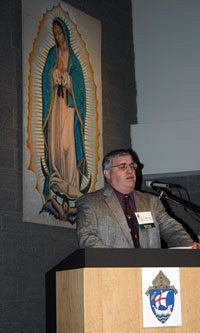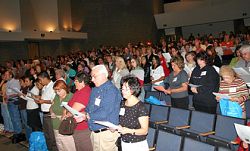Diocesan Religious Education Congress 2006: 'As the Father Has Sent Me, So I Send You'

DRAPER — In today’s rapidly changing and challenging world, getting out the Good News of Jesus Christ’s resurrection and our salvation is more difficult than ever and more important than ever, said Daniel S. Mulhall, a staff member of the United States Catholic Conference (USCCB) Office of Catechesis and a member of the Bishops’ Committee on Catechesis. In his keynote speech to more than 500 religious educators at the 2006 Diocesan Religious Education Congress Sept. 30 at the Skaggs Catholic Center in Draper, Mulhall said the mission Jesus gave his disciples is the same mission religious educators have today: "Go, make disciples of all nations, baptizing them in the name of the Father, Son, and Holy Spirit, teaching them all that I’ve taught you." As catechists, he said, "we take seriously the mission that Jesus gave us. We are in the business of making disciples – it’s what we do. We do this through the message we teach, through our lives of prayer and Christian witness, and through our love and care for those entrusted to us." Mulhall urged catechists to evangelize, "for if we don’t evangelize, discipleship will not happen. "Catechesis nurtures the seed of faith sown by the Holy Spirit," Mulhall said. "It gives growth to the gift of faith given in baptism and makes the sacraments come alive. Catechesis develops a deeper understanding of the mystery of Christ, encourages more profound incorporation into the Church, and nourishes Christian living. It encourages discipleship in Christ and instructs in Christian prayer. Just as the mission of evangelization enlivens the Church’s pastoral and missionary activity, catechesis makes concrete her mission of evangelization. It constitutes the Good News that Christ commissioned his apostles to spread throughout the whole world and announce to very person." Mulhall said religious educators need to stop seeing themselves as teachers and start seeing themselves as matchmakers, helping people fall in love with God. He encouraged them to make ample use of the "General Directory for Catechesis" and the "National Directory for Catechesis," both valuable documents that "make clear to us that faith can only be lived within a culture. "People have to take the Word of God and make it their own where they live, work, and play..." He urged Utah’s religious educators to know and understand the unique culture in which they and their students live. Mulhall spoke of the global culture, the regional culture, and the local culture, all of which impact and shape us. All evangelization, all catechesis, is local, personal, and relational, and as catechists develop loving relationships with those they catechize, their students will come to a loving relationship with Christ. He cautioned catechists not to let a person’s skin color, nation of origin, or language stand in the way of good catechesis. "It does no harm for me to accept the culture that shaped me and recognize the good things it has given me. But I alone am responsible for acting out of the attitudes I learned. I can blame no one else for my actions. I must do this, not because it is politically correct, God help us, but because that is the only way I can evangelize and catechize others." The Congress offered 23 workshops in four sessions, one in each session in Spanish. Auxiliary Bishop Gabino Zavala of Los Angeles presented a keynote speech in Spanish that emphasized the importance of being sensitive to the culture in which people live, but not letting the secularized culture consume people to the exclusion of their faith lives. Odgen Deacon Michael Bulson spoke of the search God makes for each one of us, and asked a full workshop, "Is God looking for you? Referring to the writings of Thomas Merton and Rabbi Rami Shapiro, Deacon Bulson, who serves St. Joseph Parish, led his workshop to a deeper understanding of contemplation and contemplative prayer. "We need to re-create conditions in which we can get to know God and God can know us," he said. "We need to be awakened to the awareness of God." Deacon Bulson spoke of finding God in nature, in scripture, and in Jesus Christ. "Our spiritual journey leads us back to our interior; back to God," he said. "We have to be aware that it is the Incarnation, that Christ event, that allows us to journey back to God." The Congress contained as strong thread of service to others as evidenced in the workshops of Deacon Forrest Gray, Father James Flynn, Dr. Kandie Brinkman, Diocesan Government Liaison Dee Rowland, and Maria Cruz-Gray, director of the Diocesan Office of Hispanic Ministry. Scripture also played a role in presentations by Mary Ann Barnett, Sister of St. Louis Brid Long, Father Sam Dinsdale, Dulce Jiménez-Abreu, Marcella Burden, and William Trentman. At the closing Mass of the Congress, Diocesan Administrator Msgr. J. Terrence Fitzgerald thanked catechists for the work they do on behalf of the people in their parishes and the Diocese of Salt Lake City. He spoke with concern of "the extensive ignorance of the faith." "We know well that too many adults, as well as young people, fail to grasp the essentials of our faith, whether we speak of sacred Scripture, liturgy, devotions, church history, prayer, or the catechism," he said. "We have wonderful educational resources available for us today, yet many still fade away from a faith tradition they never really understood. That is certainly a pastoral concern that we face in our various ministries." Drawing from the Gospel of the day, Msgr. Fitzgerald said Saint Mark challenges us to reflect on one specific aspect of pastoral care, "the need for our ministry to be all-embracing and inclusive, on reflecting a hospitality that keeps the welcome mat out and our greeters at the church door. I would add, one that encourages us to seek out those whose stories we might not know, but whose families hunger for faith." Using the words of Pope Benedict XVI, he said, "Those who work in the name of the Church need a ‘formation of the heart.’"
© Copyright 2024 The Diocese of Salt Lake City. All rights reserved.


Stay Connected With Us